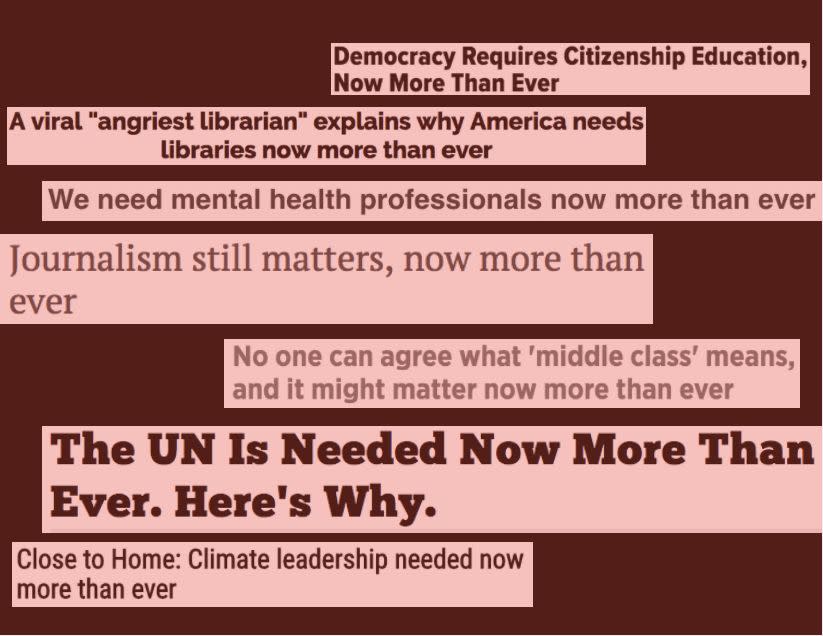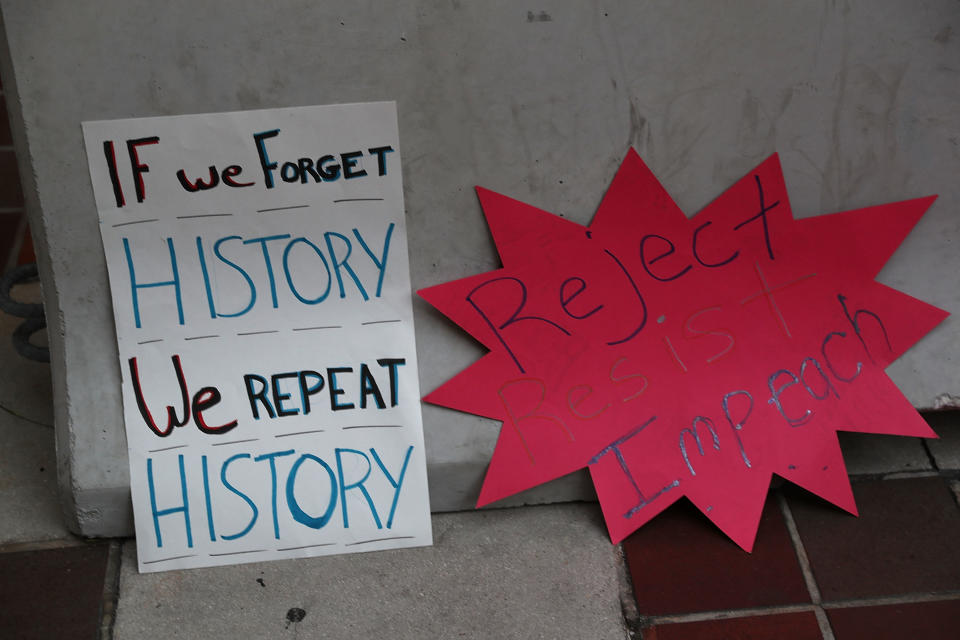'Now More Than Ever' And The Distracting Urgency Of Our Words

On Nov. 2, New York Times columnist and noted husband of his former research assistant David Brooks graced the American reading public with his musings on the current wave of public sexual harassment allegations.
Brooks’ column was quickly mocked across social media, especially his choice to dub sex “a golden nugget” and his normcore take on arousing pop songs. But what’s really odd and befuddling about his take was this blithe lede: “The world seems full of sexual predators these days.”
Brooks doesn’t explain the basis for implying that there are more sexual predators today than before (in fact, even the recent accusations against film producer Harvey Weinstein and several other high-profile men span many decades), or for later asserting that the line between men seeking sexual pleasure and men preying on unwilling women is “blurrier” now than in the past. Presumably sexual harassment was easy for Brooks to ignore before the news cycle became saturated with it.
In this, Brooks fell prey to the sort of ahistoricism that certainly isn’t new, but which has felt intrusively ubiquitous during this painful, exhausting year. Everything is worse than it has ever been; we have never needed salvation more than we do now. America’s standing in the world, political divisions, race relations, treatment of women ― evidence notwithstanding, mainstream discussions often take for granted that these things have never been at a lower ebb.
Perhaps the most representative phrase for a year in opposing Trump is, fittingly, “Now more than ever.” Over the past 12 months, the media, institutions and public figures have worn the phrase out, leaving “now more than ever” a brittle husk, a cliché that conjures an eye roll rather than a sense of urgency.
After the election of President Donald Trump, we needed the arts now more than ever; we needed a free press now more than ever; we needed comedy now more than ever; we needed political dialogue now more than ever. Each individual cause or pursuit that seemed distasteful or trivial in the new state of political panic had to be defended, and each time the defense was the same: The very environment that makes this seem unimportant is the reason that it’s important.
By March, The Washington Post declared that “now more than ever” had to go. Of course, since then, we’ve found that we need robust missile defense, immigrant workers and young people voting in local elections ― now, more than ever.
“Now more than ever” leverages the weight of history while simultaneously turning away from it. To say that we have never been in such dire straits is a powerful statement because history is long and full of dire straits ― plagues, genocides, wars ― and yet now is somehow worse. But that assertion only holds up as long as one doesn’t actually look back on those plagues, genocides and wars. We can say that America is in the lowest place we can remember, but it likely requires us to forget or downplay events in our own lifetimes, from the Jim Crow era to the September 11 attacks. We can imagine that sexual harassment is a new problem, but that requires us to ignore the Anita Hill hearings, the accusations against Bill Clinton and, frankly, the entire history of men having power over women.
This attitude is somehow both nerve-jangling and soothing. It’s like declaring bankruptcy: A painful road lies ahead, but you have permission to forget about any embarrassingly awful turns you made to arrive here. Shocked Trump was elected? Surprised about the sexual harassment faced by all your female colleagues? Blindsided by the rise of the white nationalist movement? Don’t waste time grappling with the fact that you didn’t bother to vote, or sat silently when your male coworkers made sexist jokes, or ignored the targeted aggression faced by black women online in recent years. Focus on the particularly fierce urgency of now.

Both Trump’s slogan, “Make America Great Again,” and the rallying retort from his opponents, “America Is Already Great,” traffic in this sort of convenient amnesia: Either way, America starts from a base point of greatness. Either way, its ugly roots in mass genocide, human trafficking and forced labor have been swept aside.
The winners write the history books, and in America the winners have always been white men. Even when human rights for the oppressed have triumphed, powerful white men on both sides have been motivated to minimize the past injustices and to glorify their own roles. Many of the narratives now accepted as common wisdom were composed with a power-consolidating agenda. These narratives demonize or ignore people of color; they sow distrust of women’s words.
With the racist backlash to the election of President Barack Obama, followed by the election of Trump, who has used rhetoric favored by white nationalists, white Americans have been confronted with a racial divide in the country that our national mythologists had been working for centuries to paper over. It seems worse now than ever; it’s not. Before, though, the suffering of people of color, and especially black people, was submerged beneath our self-congratulatory national narratives.
Men have been similarly blindsided by the recent wave of sexual assault and harassment allegations against industry leaders ― or, at least, blindsided that anyone cares. Brooks isn’t the only one to wax astonished at this new wave of sexual misconduct. But the crimes existed before this month, and the perpetrators were enabled and protected by willful ignorance and anti-feminist cultural narratives.
“This tsunami of stories doesn’t just reveal the way that men have grabbed and rubbed and punished and shamed women; it shows us that they did it all while building the very world in which we still have to live,” wrote Rebecca Traister last month. She noted, in particular, the spate of sexual harassment allegations against political reporter Mark Halperin ― a man whose book, Game Change, largely defined the narrative of the 2008 election.
“The same power that afforded Halperin the ability to allegedly rub up against younger colleagues,” wrote Traister, “also meant that he got to shape the nation’s view of a woman whose political story had already been shaped by other men who abused their power.” His take on Hillary Clinton, she pointed out, was a harsh, nuance-free portrait of “a grasping and scandal-plagued woman.” His coverage of Trump, in the 2016 election, was relatively flattering. He downplayed sexual harassment claims against Trump; now the public has learned that Halperin behaved similarly with younger female colleagues.
Halperin’s power to shape political narratives has taken a severe hit. A planned book on Trump’s campaign was scuttled by Penguin following the allegations, and HBO dropped a planned movie based on the book. But, as Traister notes, we still have to live with the narratives he propagated.
Consider the 2016 Democratic primary. Even as the party is undoubtedly divided and in disarray, postmortems are met with annoyance and outrage from whichever group was satisfied with existing narratives. When Bernie Sanders supporters spent the weeks after the election chorusing, “Bernie would have won,” centrist Democrats were dismissive. When Clinton came out with a book about her 2016 campaign, critics across the political spectrum sniped that she needed to go away and be quiet rather than pick at the party’s wounds. This is framed as a call to “move on” or to “look ahead,” and can be directed at anyone, on any side of the divide, who wants to re-litigate an aspect of the primary. But perpetually looking ahead, or ― still worse ― looking only at the present moment, only ensures that we will continue to live with damagingly false ideas about our past.
And, as William Faulkner wrote, the past is never past. We continue to live within societies and institutions shaped by what has happened to us.
In 2014, Ta-Nehisi Coates published a powerful case for reparations in The Atlantic. “Won’t reparations divide us?” he wrote. “Not any more than we are already divided. The wealth gap merely puts a number on something we feel but cannot say ― that American prosperity was ill-gotten and selective in its distribution. What is needed is an airing of family secrets, a settling with old ghosts.” Until we fully reckon with the crimes of America’s history, and reconstruct a national identity that incorporates a full understanding of them, he argues, those crimes continue to reverberate throughout our society.
“Now more than ever” and its attendant naïf posture about the longstanding ills of American culture and politics are paper over the cracks in our foundations. They’re stories we tell ourselves to explain away the damage we’ve found as a surface flaw. But fixing our country requires more than excuses and misdirection. Now, as ever, it requires us to look fearlessly into our past and be honest about what we see there.
Related...
How AIM Became A Secular Confessional Box For A Generation Of Teens
The 'Casting Couch' Euphemism Lets Us Pretend Hollywood's All Right
When Booting Dead White Guys Off Reading Lists Is A Good Idea
Love HuffPost? Become a founding member of HuffPost Plus today.
This article originally appeared on HuffPost.

